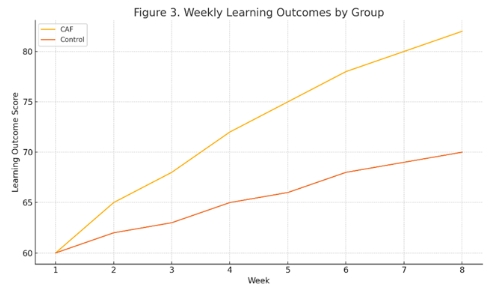The Impact of Culturally Adaptive Feedback in Information-Interaction Systems on Language-Learning Motivation and Outcomes
DOI:
https://doi.org/10.70393/6a6574.333036ARK:
https://n2t.net/ark:/40704/JET.v2n1a01Disciplines:
Educational PsychologySubjects:
Learning MotivationReferences:
5Keywords:
Information-interaction System, Culturally Adaptive Feedback, Language-learning Motivation, Learning Outcomes, Cross-cultural EducationAbstract
Grounded in social-cognitive learning theory and the cross-cultural adaptation framework, this mixed-methods study tests how culturally adaptive feedback (CAF) delivered through an information-interaction system affects university EFL learners’ language-learning motivation and learning outcomes. One hundred and twenty second-year students were randomly allocated to a CAF group and a control group for eight weeks. The quantitative phase employed a 2 (group) × 2 (time) mixed-design ANOVA; the qualitative phase conducted semi-structured interviews with 18 learners, followed by thematic analysis. The findings are as follows: (1) post-test motivation in the CAF group was significantly higher than in the control group, group × time interaction F(1, 118)=15.27, p = .0002, partial η² = .115; (2) the growth rate of learning outcomes in the CAF group significantly surpassed that of the control group, interaction F(1, 118)=12.45, p = .0007, partial η² = .095, end-point Cohen’s d = 2.04; and (3) three high-frequency themes—“enhanced self-efficacy,” “high cultural relevance,” and “increased engagement”—were distilled from the interviews, corroborating the motivation-to-outcome pathway. The study extends the explanatory power of CAF in cross-cultural language learning, demonstrates the motivational amplification generated by culturally contextualised feedback in tandem with self-efficacy, and provides empirical evidence for feedback design in online platforms and classroom practice.
References
[1] Fan, X. Y. (2023). Design and implementation of an online language-interaction learning system based on speech-recognition technology. Automation and Instrumentation, (7), 187–190, 195.
[2] Zhao, J. (2022). The impact of emotional interaction on learning motivation in online collaborative learning [Doctoral dissertation, Northeast Normal University].
[3] Li, M., & Yan, D. (2023). Effects of bilingual interactional context on language control and cognitive control. Neijiang Science and Technology, 44(10), 93–95.
[4] Ai, Y., & Tang, Y. (2021). Waiting interval and system responsiveness effects on waiting experience and learning outcomes in voice interaction. Human Ergonomics, 27(1), 1–6.
[5] Jiang, Y., Zhang, T., & Liu, H. (2025). Research and Design of Blockchain-based Propagation Algorithm for IP Tags Using Local Random Walk in Big Data Marketing. Authorea Preprints.

Downloads
Published
How to Cite
Issue
Section
ARK
License
Copyright (c) 2025 The author retains copyright and grants the journal the right of first publication.

This work is licensed under a Creative Commons Attribution 4.0 International License.
















